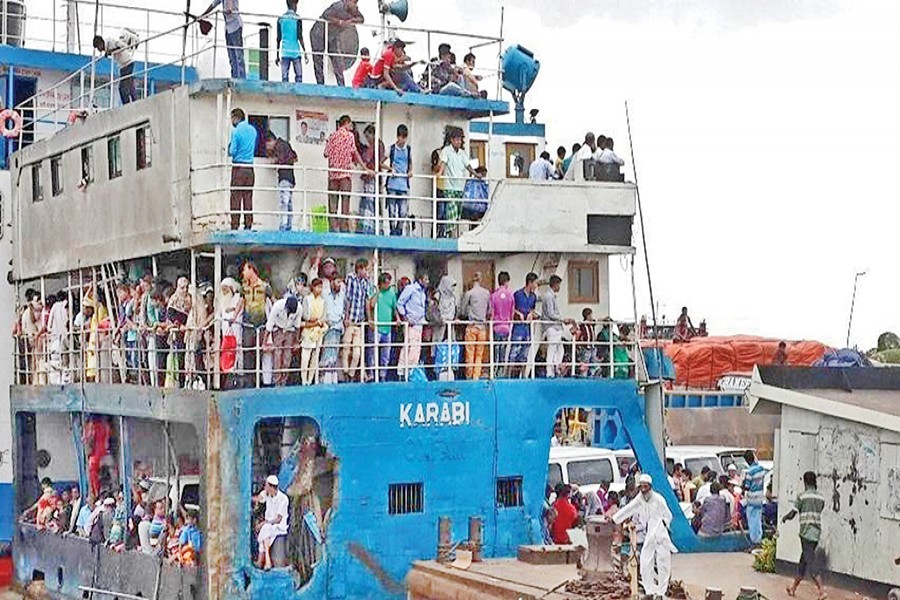
Published :
Updated :

Garment factories will remain open from today (Sunday) only at Savar off the city despite the ongoing shutdown amid the coronavirus pandemic, sources said.
Considering the overall situation, Bangladesh Garment Manufacturers and Exporters Association (BGMEA) president Rubana Huq urged all members to keep their units shut until April 11.
However, hundreds of garment workers are coming back to Dhaka from different parts of the country despite ban on public transport.
Besides, factory owners in the Ashulia industrial belt at an emergency meeting held on Saturday decided that RMG units in Ashulia industrial zone will reopen from Sunday.
Some 50 factory owners, headed by Abdus Salam Murshedy, managing director of Envoy Group, took the decision.
When asked, MrMurshedy said some 50 factory owners from Ashuliazone sat on Saturday and decided that factories will remain open since Sunday.
They took the decision in line with the instruction of Department of Inspection for Factories and Establishments (DIFE).
DIFE on April 01 in a notice said the export-oriented factories which have work orders, are willing to run factories and engaged in manufacturing personal protective equipment, mask, hand wash/sanitizer and medicine to prevent coronavirus, can run their units provided they ensure adequate health safety of workers.
The meeting also called on apparel makers to pay wages for the month of March to workers from April 12 to 15, MrMurshedy added.
BGMEA president Dr Rubana Huq in an audio message said the factories having work orders and are engaged in manufacturing safety equipment can reopen in line with DIFE's instruction provided they can ensure sufficient health safety.
She urged all members to pay March wages timely and not terminate any workers if any of them is absent.
BKMEA on Thursday in a statement said it would not take any decision about factory closure from April 05 and its previous instruction regarding closure until April 04 would not be effective from Sunday.
It asked its member factories to take their own decision at their own risk and responsibility regarding keeping their factory open.
Mohammad Hatem, senior vice president of BKMEA, in a video message urged member units, if possible, to keep their respective factories closed until April 10.
According to the Industrial Police (IP) data, there are 425 garment factories registered with BGMEA in Ashulia zone. And only 27 BGMEA member units remained shut while 422 remained open until Saturday.
Only 12 out of 81 BKMEA member units, four out of 21 registered Bangladesh Textile Mills Association (BTMA) factories and 02 out of 98 factories under Bangladesh Export Processing Zones Authority remained closed until Saturday.
And 32 out of 731 factories from other sectors were closed.
The majority of the apparel manufacturing units in other industrial belts like Gazipur, Chattogram, Narayanganj, Mymensingh and Khulna, however, remained closed, according to IP sources.
Some 7,602 factories including textile and clothing are under the jurisdiction of IP and 5,821 were closed while 1,781 were open.
Meanwhile, close to a billion pieces of clothing items have been stockpiled or under production in factories as work orders cancellation continues in the aftermath of coronavirus, owners said.
Until Saturday, over 1,100 factories reported that export orders for 946.90 million pieces of readymade garment items worth US$3.02 billion were cancelled or held up, affecting 2.19 million workers, according to the lobby group Bangladesh Garment Manufactures and Exporters Association, or BGMEA.
Similarly, 281 member units of the Bangladesh Knitwear Manufacturers and Exporters Association, or BKMEA, reported that orders for more than $3.0 billion were cancelled or held or suspended until Friday.
Citing primary data of the National Board of Revenue, the BGMEA said single month apparel exports in March 2020 dipped by 26.70 per cent to $1.97 billion versus $2.69 billion in March 2019.
In contrast, dozens of global buyers have come forward to rescue the local textiles makers giving assurance of taking in the goods already produced even as the European Union, the US and Canada, the country's key export destinations, enforced lockdown to slow the spread of the deadly virus.
Buyers such as H&M, PVH, Inditex, M&S, Kiabi, Target, Benetton, Decathlon, and KappAhl and PVH have assured local RMG makers of taking in their already-produced goods after the BGMEA urged the retailers not to cancel or hold up the existing orders.
H&M, one of the country's largest global apparel buyers that sources apparels worth more than $3.0 billion a year from Bangladesh, in a statement last week, announced that it would get the delivery of the already produced garments and goods in production and pay for the orders.
It, however, said it would not ask for any discounts and temporarily suspend placing new orders to its listed supplier factories in Bangladesh amid the coronavirus outbreak.
Talking to the FE, Mahmud Hasan Khan, managing director of Rising Group, said factories have a good number of products either on stockpile or in the process of production due to the current cancellation or suspension.
The owners, however, said only H&M and Inditex have committed to unchanged payment terms.
Some of the buyers want to take 90 to 120 days to make the payment, they said, unsure about the delivery dates.
A few apparel makers alleged that the conditions of Bestseller, C&A and Primark are not business-friendly.
When asked, BGMEA president Dr Rubana Huq said some brands have come forward and informed the trade group of their decision to take the delivery of ready goods and the goods in production.
She welcomed the decision to support the local suppliers and expressed the hope that the payment terms would remain unaffected, thereby ensuring liquidity flow to the factories.


 For all latest news, follow The Financial Express Google News channel.
For all latest news, follow The Financial Express Google News channel.